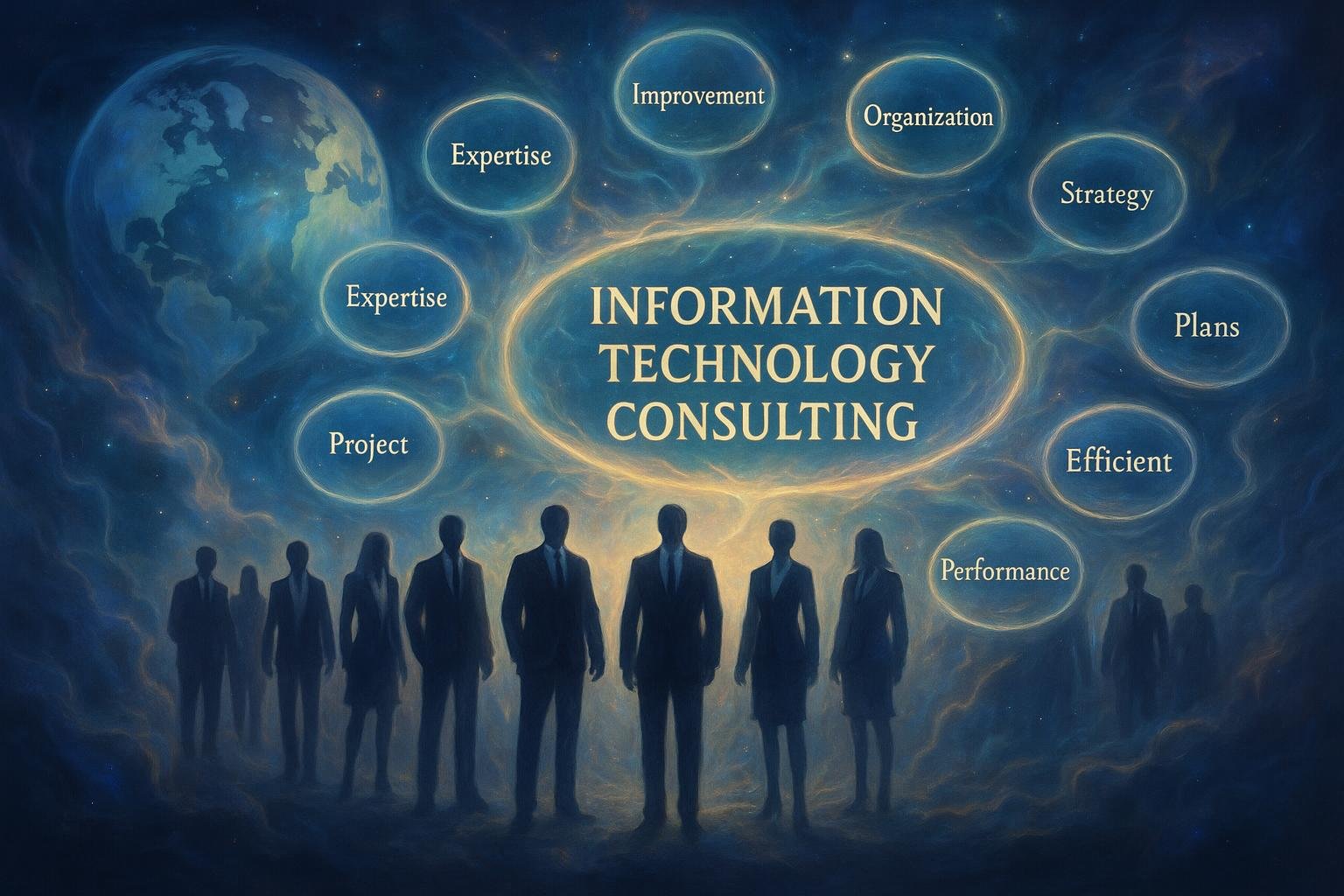Key Advantages for Modern Enterprises
Strategic IT consulting gives your organization a crucial edge in navigating today’s fast-changing business climate. With constant technological shifts and market demands, it’s easy to feel overwhelmed by what to tackle next.
By relying on experienced IT consultants, you get valuable guidance to help you make informed choices and align your technology investments with your goals.
These experts help you adapt quickly by improving processes, optimizing infrastructure, and strengthening your data strategy. They also support your efforts to safeguard information and meet compliance standards, so you’re prepared for opportunities and risks in your industry.
Key Takeaways
- Strategic IT consulting aligns technology with your business goals.
- It helps you adapt to changes and stay ahead of competitors.
- Expert guidance supports better security, efficiency, and growth.
Understanding Strategic IT Consulting
Strategic IT consulting helps your organization align technology initiatives with business objectives. This approach boosts efficiency and supports innovation.
It also enhances your ability to navigate market and technology changes. That’s not always easy, but it’s essential to keep up.
Defining Strategic IT Consulting
Strategic IT consulting is a professional service that helps your business use technology to solve problems and achieve goals. Unlike ad hoc IT support, this service focuses on shaping long-term strategy instead of just fixing technical issues as they pop up.
When you work with consultants, you analyze your current technology landscape together and develop an actionable roadmap for improvement. This means assessing existing systems, spotting gaps, and planning upgrades or new deployments that support your vision.
Consultants don’t just recommend tools. They help you make technology integral to your business growth and operational success.
With their guidance, you can turn IT from a cost center into a fundamental driver of progress.
Key Components of IT Consulting Services
You’ll run into several core services when you engage in IT consulting. These usually include:
- IT strategy development and planning
- Technology assessments and audits
- Risk management advice
- Vendor selection and management
- Implementation support
- Change management guidance
Each piece plays a distinct role. Strategy development helps you set clear IT goals, while risk management anticipates cyber threats and system vulnerabilities.
Vendor management assists you in choosing the right technology partners. Change management ensures that your teams adopt new solutions smoothly.
Good consulting also prioritizes scalability, integration, and cost management. These are critical for adapting to future business needs. For more about these components, check out how strategic IT consulting enhances business potential.
The Role of IT Consultants in Business Transformation
IT consultants bring specialized expertise to your organization. Their outside perspective helps you spot opportunities for improvement or innovation that your internal teams might miss.
Consultants guide you through technical transitions—think cloud migrations or upgrading enterprise software. They also support process optimization, cybersecurity improvements, and rolling out new business models.
An effective consulting partner will help refine your decision-making and align IT with long-term objectives. They’ll also prepare your company for continuous change.
That adaptability is key to staying resilient and competitive in today’s fast-paced business environment. Explore more about the role of IT consulting firms in modern business strategy.
Adapting to Market Changes with IT Consulting
Strategic IT consulting empowers your organization to anticipate, analyze, and address rapid changes in the marketplace. With expert guidance, you can make better decisions and remain resilient in fast-moving environments.
Identifying Emerging Industry Trends
IT consultants use advanced analytical tools and solid research methods to track technological shifts, competitor activities, and market preferences. Digging into large volumes of industry data, they pick up early signals of new trends and innovations.
You can use this insight to realign your technology strategy, ensuring your business doesn’t fall behind. For example, consultants help you evaluate which digital solutions—like AI or cloud computing—are gaining traction and make sense for your business.
The process often includes trend monitoring dashboards, regular briefings, and tailored reports. These keep you focused on opportunities for strategic investment. This support can maximize your competitive advantage and prepare you for future market changes. Learn more about the importance of trend recognition through strategic IT consulting.
Proactive Risk Management Strategies
IT consultants help you anticipate and tackle technology-related risks by combining risk assessment and scenario planning. They identify vulnerabilities in your infrastructure, business processes, and compliance obligations before they cause problems.
Common strategies include regular security assessments, disaster recovery planning, and policy development. Consultants also guide you through adopting new regulatory standards to ensure data protection and business continuity.
A straightforward risk management approach limits costly downtime and reduces operational surprises. It also safeguards your organization’s reputation. With the right consultants, you can build a controlled IT environment that’s ready for evolving threats. Discover practical risk management steps from technology consulting services.
Enhancing Business Agility
IT consulting is essential for improving your organization’s responsiveness to change. Consultants analyze your operations and recommend scalable, flexible solutions—like cloud platforms, automation, or modular software—that let you adjust quickly to new demands.
They focus on streamlining workflows and breaking down barriers to collaboration across departments. That helps you launch new products, respond to customer feedback, and reallocate resources as priorities shift.
Consultants also help you set up efficient communication channels and digital platforms for faster decision-making. These strategies allow your business to adapt swiftly and smoothly in today’s dynamic landscape.
Driving Competitive Advantage Through Technology
Strategic IT consulting enables your organization to adapt quickly to disruptions and outpace competitors. Using advanced technology boosts efficiency, decision-making, and innovation—the main drivers of business growth.
Leveraging Advanced Digital Solutions
Staying ahead in today’s marketplace means using tools that directly impact productivity and customer satisfaction. With IT consultants, you can identify digital solutions that fit your objectives, from cloud migration to specific application deployments.
Consultants assess your infrastructure and recommend technologies that offer real results, like improved scalability, security, or user experience. They help you avoid costly investments in tools that don’t fit your needs or industry, making your tech environment more streamlined.
Modern solutions also let your teams collaborate across locations with integrated platforms. This digital foundation helps you respond quickly to market opportunities and deliver better value to customers. For more info, learn how companies drive competitive advantage through technology.
Optimizing Operations with Automation
Automation is key for reducing errors, eliminating repetitive manual work, and speeding up workflows. IT consultants guide you in picking the right automation tools for tasks like data entry, customer service, or financial processing.
By automating routine processes, your employees can focus on higher-value work that requires problem-solving or creativity. Automating compliance and reporting also minimizes risk and helps you meet regulatory requirements more efficiently.
Consultants ensure automation tools integrate smoothly with your existing systems to keep disruption low. Benefits include faster turnaround times, lower operational costs, and a more agile response to new business demands. Review the role of IT consulting in optimizing technology and reducing costs for more details.
Implementing Data-Driven Decision Making
You get a real edge by using data analytics to inform business choices. IT consultants help you set up a reliable data infrastructure and analytics tools that turn huge amounts of information into actionable insights.
With access to visual dashboards, trend analysis, and predictive models, your leadership team can spot growth opportunities, find inefficiencies, and react to market changes. Data-driven decision making takes the guesswork out of big business moves.
You can also benchmark performance against competitors and set clear, data-backed goals for improvement. This approach lets you build dynamic, informed strategies that align your organization with short-term needs and long-term objectives. For more on how analytics drives advantage, visit this overview on leveraging data and analytics for business growth.
Aligning IT Strategy with Business Goals
Strategic IT consulting makes sure your technology actions support specific organizational objectives. You can see real efficiency, innovation, and competitiveness gains by translating business needs into actionable IT strategies.
Establishing Technology Roadmaps
A technology roadmap outlines the systems and solutions you’ll need to meet your long-term business goals. It’s a structured way to evaluate new technologies and prioritize projects that deliver the most impact.
With a solid roadmap, you align IT investments with your company’s timeline, budget, and growth plans. This includes regular IT audits and ROI-driven strategies, which help organizations make smarter decisions about technology investments.
Key components of a technology roadmap:
- Clear milestones tied to business priorities
- Defined responsibilities for IT leaders and stakeholders
- Regular reviews to adjust to market or organizational changes
- Budget alignment with expected value and outcomes
Effective roadmaps also cut the risk of costly or unnecessary technology changes. That way, your IT strategy keeps up with your evolving business objectives.
Improving Cross-Department Collaboration
Aligning IT with business goals takes open communication between IT and other departments. When each department shares its objectives, your IT strategy can focus on projects that make the biggest difference for daily operations and long-term plans.
IT consultants often bridge the gap by translating technical language into business terms. Organized workshops, clear feedback channels, and shared performance dashboards help break down silos and encourage real collaboration.
By weaving technology planning into bigger business discussions, you ensure IT solutions are relevant and timely. This approach helps you manage risks and spot opportunities to innovate, ultimately supporting your organization’s competitive advantage as outlined in this overview of strategic IT consulting.

Ensuring Security and Compliance
Strengthening your organization’s IT security and ensuring compliance are critical steps for reducing risks and building customer trust. Strategic IT consulting supports you in proactively managing threats and meeting industry regulations.
Integrating Cybersecurity Best Practices
You face increasingly sophisticated cyber threats that can target vulnerabilities at any level of your IT systems. Effective consultants perform thorough risk assessments and help you spot gaps in your security framework.
They assist you in putting in place advanced cybersecurity measures like multi-factor authentication, endpoint protection, and routine vulnerability assessments.
A quick list of recommended best practices includes:
- Performing regular security audits and penetration testing
- Training staff to recognize phishing and social engineering attacks
- Monitoring networks continuously for suspicious activities
Consultants also make sure your security policies evolve with new threats and technologies. This proactive approach can reduce the chance of costly data breaches and help safeguard your organization’s reputation and finances.
Meeting Regulatory Requirements
Compliance requirements vary wildly by sector and geography, so you must know which regulations hit your business. IT consultants dig into your current systems and craft compliance strategies that actually fit—think GDPR, HIPAA, PCI-DSS, or SOX.
They’ll walk you through setting up and documenting processes for data handling, access controls, and incident response. Usually, consultants bring in compliance checklists and automated tools to make ongoing monitoring and reporting much easier.
Benefits of expert compliance consulting include:
| Benefit | Description |
|---|---|
| Reduced risk of legal penalties | Proactive compliance lessens the risk of audits and fines |
| Improved data management practices | Streamlined processes for handling sensitive data |
| Increased stakeholder confidence | Meeting standards builds trust with partners and clients |
Supporting Sustainable Business Growth
Supporting sustainable growth means syncing your tech strategy with your long-term business goals. That calls for careful planning and a culture where adaptation and improvement aren’t just buzzwords—they’re habits.
Scalable IT Infrastructure Planning
When your IT infrastructure scales, your organization can respond faster to market shifts and sudden demand. Strategic IT consulting lets you review your current systems and predict what you’ll need down the road, so your resources grow in step with your company.
Consultants help you pick cloud solutions, virtualization tech, and solid data management tools. These choices make it easier to handle traffic spikes while keeping performance and reliability steady. Planning for scalability helps you dodge costly downtime and pointless over-investment.
Key benefits of scalable planning:
- Flexible resource allocation
- Cost control with pay-as-you-grow models
- Rapid deployment of new applications
Fostering Innovation and Change
Innovation keeps your business nimble in a world that never sits still. Strategic IT consulting can bring in agile project management and digital transformation strategies that work for your team.
Your teams get the structure to experiment, measure results, and pivot quickly. Consultants also help you attract and keep top talent by building a culture where creative problem-solving matters. It’s a way to keep improving without losing focus on what matters for the business.
Strategic technology consulting lets you foster innovation, boost efficiency, and secure sustained business growth—even as the world changes.
Selecting the Right IT Consulting Partner
Picking an IT consulting partner is about more than just technical know-how. Your choices shape your ability to innovate, manage costs, and stay agile.
Evaluating Expertise and Experience
To find the right fit, look for consulting firms with a track record in your industry. Case studies and client testimonials that show real results matter. It’s worth checking the certifications and specialties of their consultants, plus how well they keep up with new tech.
Prior experience with projects like yours is a must. You want someone who gets your industry’s regulations, security rules, and workflows. Ask for specific examples where they’ve solved problems that look a lot like yours.
A transparent process for reviewing your current IT setup also counts. The right partner brings a step-by-step approach, helping you line up your tech with your business goals. Firms with clear methodologies usually deliver projects more smoothly. Take a look at this step-by-step guide to choosing an IT consulting partner if you want more details.
Assessing Collaborative Approach
Collaboration isn’t just about checking in and sending updates. Look for consultants who want your input and adjust to your working style. Their communication style should fit your company, so working together feels natural.
A good consulting partner shapes their services around your needs, not just their standard playbook. They invite feedback, encourage knowledge sharing, and set clear roles. That kind of understanding cuts down on confusion and builds trust.
Some signals of a collaborative approach: open communication, flexibility in project plans, and a real effort to involve your stakeholders. Firms focusing on partnership, not just product delivery, tend to get better results. If you’re curious, here’s an analysis of choosing the right IT consulting firm through a strategic approach.
Conclusion
Strategic IT consulting helps you align technology with your business’s needs. When you get expert advice, you find more innovative ways to keep your company moving forward and handle whatever the market throws at you.
You tap into fresh insights about new tech, risk management, and process tweaks. That knowledge makes deciding what to do next easier, especially when unexpected problems arise.
Some real perks of strategic IT consulting:
- More efficient operations
- Better scalability and flexibility
- Stronger connection between tech and business goals
- Up-to-date industry best practices
A solid tech strategy keeps your organization steady, even when things get bumpy. Consultants can help you sketch a roadmap that covers what you need now and what might come later.
If you want to dig deeper, check out how IT strategy consulting lines up technology with business goals or see how expert guidance shapes technology planning.


